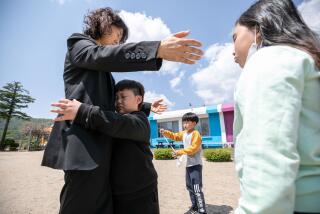Russia’s Latest Revolution Involves 21 Million Schoolchildren : Education: Pupils face an array of choices not known under communism. But schools are poorer, and some parents pay fees for honors programs.
MOSCOW — Dressed as an American cowgirl in fringed jacket and boots and bearing gladioli for her teacher, Ksenya Vasilyeva stood at attention Wednesday in the largest collective ritual to survive the Soviet era--the opening of schools throughout Russia all on the same day.
But when the yawn-inspiring welcome speeches ended and 8:30 a.m. bells rang across 11 time zones, uniformity gave way to variety as 21 million schoolchildren plunged into a bewildering array of curriculum choices that is changing the way Russians prepare for adult life.
“We can call this a revolution,” Education Minister Yevgeny Tkachenko told the newspaper Nezavisimaya Gazeta in an interview this week. “For the first time, we are changing from a uniform education to one based on choices for the student.”
For 7-year-old Ksenya and her parents, the choice was an accelerated program that offers first-graders such special subjects as astronomy, history through folk legends and a review of myths about the origin of planet Earth.
“I’m so excited, I feel as if I’m the one starting school,” exclaimed Ksenya’s mother, Galina Vasilyeva, an ecologist, during the ceremony outside School No. 1289 in Moscow, an event captured by many parents on video cameras. When a visitor asked how she felt, the child blushed and ran away.
The Soviet state monopolized education, required pupils to join the Communist Young Pioneers and wear uniforms, issued about 100 standard texts and made 14 subjects compulsory in grades 1 through 11. Uniforms became optional in 1990, and the party lost its hold on student bodies as the Soviet Union crumbled two years ago.
Since then, Russia’s Education Ministry has issued 127 new texts purged of Communist ideology and is planning about 375 more. The number of required courses was reduced this year to eight--language, literature, the arts, social science, natural science, mathematics, technology and physical education--leaving at least 12 hours of class time each week for electives.
What is more, the choice of subjects within those broad mandatory categories has multiplied. Russia’s far-flung regional governments have taken more control over curricula, launching instruction in such native languages as Tatar and Chuvash.
“We have stopped driving children into a corner, ruining their health, forcing them to learn one and the same thing regardless of the fact some may like chemistry and others may like literature,” Tkachenko said.
But Russia’s switch to the free market has left the public schools poorer. In Moscow’s School No. 978 on Wednesday, Vice Principal Tamar P. Serdyuk complained of a “deep, deep crisis” that has “destroyed the school system with endless perestroikas ,” forcing the best teachers to flee to private schools or other professions.
About 25,000 Russian students are enrolled in 500 private schools, a total still dwarfed by 67,000 free public schools. Many private schools are struggling to acquire real estate, pass building inspections and collect tuition; 30 of them went broke in Moscow last year.
A new option is becoming more popular: Parents pay fees to private “learning firms” to supervise parallel honors curricula within public schools. Such curricula are known as “gymnasiums,” as were the classical secondary schools based on the German model that were abolished in Russia after the 1917 Bolshevik Revolution.
School No. 1289, an elite school with one of the best foreign-language programs in Russia, is trying to keep its faculty by turning itself partly into a gymnasium. Ninety-five students, a tenth of the student body, are in the accelerated program. Their parents pay 16,000 rubles (about $16) a month, nearly tripling their teachers’ salaries.
The curriculum, designed by a firm called Record, includes not only the folk history course for first-graders but also such novelties for older students as history of religion and business ethics.
Konstantin Inin, a gangly 10th-grader on the school basketball team who aspires to be a journalist, began the accelerated program with 24 classmates Wednesday. He said it was time to get serious about preparing for university.
“Being a (Communist) Pioneer made me hate this school and this system, so for nine years I didn’t study,” he said during recess Wednesday, as other students strolled by with multicolored backpacks and Western-made athletic shoes. “Now I don’t have any more time to kill. In two years, we enter grown-up life.
“We’re not used to paying for an education,” he added. “But now I realize that if it’s paid for, it must be something better. If I know I’m paying, I’ll study harder.”
More to Read
Sign up for Essential California
The most important California stories and recommendations in your inbox every morning.
You may occasionally receive promotional content from the Los Angeles Times.










